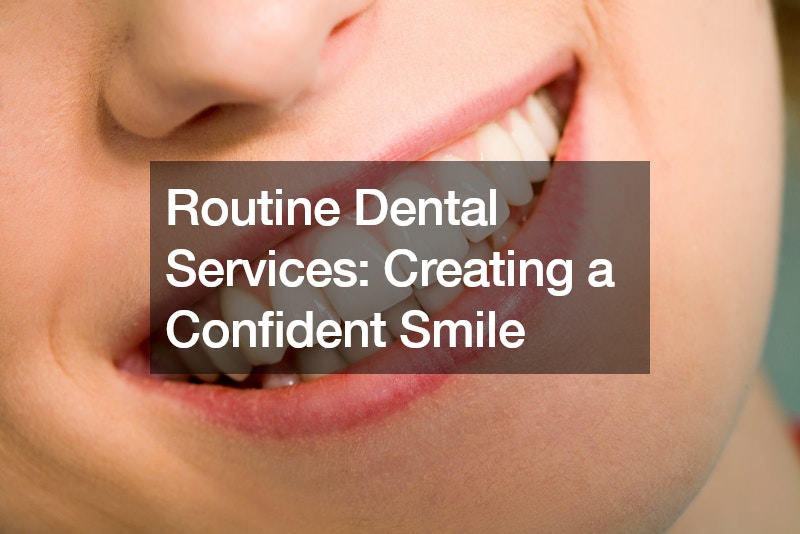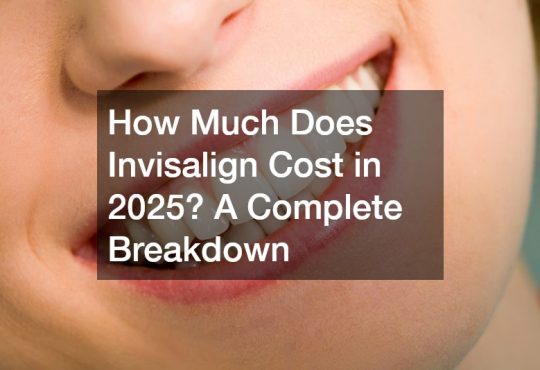
Routine Dental Services Creating a Confident Smile
Disclaimer: The material provided is designed to inform readers about oral health and preventive care. It should not be considered medical advice. Consult a registered dentist for guidance specific to your oral health needs.
Routine dental care is essential for maintaining good oral hygiene and preventing dental problems. Visiting a family dentist regularly can help in early detection of issues and provide necessary treatments. In this article, we will discuss various routine dental procedures and their importance in ensuring healthy teeth and gums.
Cleanings

Regular cleanings at a family dentist’s office are crucial for removing plaque and tartar buildup. These professional cleanings help in preventing cavities, gum disease, and other oral health issues. By scheduling routine dental cleanings, you can maintain a bright and healthy smile.
It is recommended to visit your family dentist for cleanings at least twice a year. During these appointments, the dental hygienist will thoroughly clean your teeth and gums, removing any accumulated debris. Cleanings also involve polishing the teeth to remove surface stains and improve their appearance. In addition to cleanings, your family dentist may also perform a thorough examination of your oral health. This includes checking for signs of cavities, gum disease, and other problems. Routine dental cleanings not only keep your teeth and gums healthy but also contribute to your overall well-being.
Dental Bonding
Dental bonding is a procedure commonly performed at dental offices to repair chipped, cracked, or discolored teeth. It involves applying a tooth-colored resin material to the affected tooth and then hardening it with a special light. Bonding can improve the appearance of your smile and restore the functionality of damaged teeth.
Dental bonding is a cost-effective and minimally invasive treatment option for minor dental imperfections. It can be completed in a single visit to the dentist’s office, making it a convenient choice for many patients. Whether you have a small chip or a visible gap between your teeth, dental bonding can help enhance your smile. Before undergoing dental bonding, your dentist will evaluate your oral health and discuss your goals for treatment. The bonding material is carefully matched to your natural tooth color for seamless integration. With proper care and maintenance, dental bonding can last for several years.
Root Canal Treatment
A root canal treatment is a procedure that is often performed by a dentist to save a severely infected or damaged tooth. During this treatment, the dentist removes the infected pulp from the tooth, cleans the root canals, and seals them to prevent further infection. Root canal treatment can alleviate pain and save an otherwise compromised tooth.
While root canal treatment has a reputation for being painful, advancements in dentistry have made the procedure more comfortable and efficient. Dentists use local anesthesia to ensure that patients are numb and comfortable throughout the process. Root canal treatment is a cost-effective way to preserve your natural teeth and avoid extraction. After undergoing root canal treatment, your dentist may recommend placing a dental crown on the treated tooth for added strength and protection. It is important to follow your dentist’s instructions for post-treatment care to ensure proper healing. With proper oral hygiene and regular dental checkups, your treated tooth can last a lifetime.
Teeth Whitening

Teeth whitening is a popular cosmetic dental procedure that can brighten and enhance your smile. Whether you choose an in-office whitening treatment or at-home whitening kit, teeth whitening can help remove stains and discoloration caused by food, drinks, or aging. By whitening your teeth, you can boost your confidence and improve your overall appearance.
Cosmetic dentists offer professional teeth whitening options that are safe and effective. In-office whitening treatments can brighten your teeth several shades in just one appointment. If you prefer whitening your teeth at home, your dentist can provide custom trays and whitening gel for convenient use. With proper maintenance, teeth whitening results can last for months.
It is important to consult with your cosmetic dentist before undergoing teeth whitening to ensure that it is a suitable option for you. Your dentist will evaluate your oral health and discuss the best whitening method based on your needs and preferences. Whether you have mild staining or more significant discoloration, teeth whitening can help you achieve a radiant smile.
Bridges
Dental bridges are prosthetic devices used to replace missing teeth and restore the appearance and function of your smile. A dental bridge consists of one or more artificial teeth (pontics) that are anchored to adjacent natural teeth or dental implants. Bridges can help prevent shifting of teeth, improve chewing ability, and enhance your facial appearance.
Your dentist will carefully assess your oral health and discuss the best type of dental bridge for your specific needs. Traditional bridges are secured to adjacent teeth with dental crowns, while implant-supported bridges are attached to dental implants. Dental bridges are custom-made to blend seamlessly with your natural teeth for a harmonious smile. Maintaining good oral hygiene is essential for prolonging the lifespan of your dental bridge. Proper brushing, flossing, and regular dental checkups can help prevent decay or damage to the bridge. With routine care and maintenance, your dental bridge can last for years and support your oral health.
Gum Disease Treatment
Gum disease, also known as periodontal disease, is a common condition that affects the gums and supporting structures of the teeth. If left untreated, gum disease can lead to tooth loss and other serious health complications. Routine dental care, including professional cleanings and treatments, can help prevent and manage gum disease.
Your dentist will examine your gums for signs of gum disease during routine dental checkups. Early-stage gum disease (gingivitis) can often be reversed with professional cleanings and improved oral hygiene practices. If gum disease has progressed to advanced stages (periodontitis), your dentist may recommend deep cleaning procedures such as scaling and root planing.
In addition to in-office treatments, your dentist can provide guidance on proper oral care habits to prevent gum disease. Brushing twice a day, flossing regularly, and using antimicrobial mouthwash can help reduce plaque buildup and maintain healthy gums. By prioritizing gum health and seeking timely treatment, you can preserve your smile and overall well-being.
Oral Surgeries
Certain dental conditions or injuries may require oral surgeries to restore oral health and function. Oral surgeries such as tooth extraction, wisdom teeth removal, and dental implant placement are commonly performed by oral surgeons or general dentists. These procedures are typically done in a dental clinic under local anesthesia or sedation.
Tooth extraction is recommended when a tooth is severely decayed, damaged, or causing crowding in the mouth. Wisdom teeth removal may be necessary to prevent impaction, infection, or other dental problems. Dental implant placement involves surgically inserting artificial tooth roots into the jawbone to support dental prosthetics. Before undergoing any oral surgery, your dentist will evaluate your oral health and discuss the procedure in detail. It is important to follow pre-operative and post-operative instructions provided by your dentist to ensure a smooth recovery. With proper care and hygiene practices, oral surgeries can help restore your oral health and function.
Routine Checkups

Routine dental checkups are the foundation of maintaining good oral health and preventing dental problems. Visiting an affordable childrens dentist or family dentist regularly allows for early detection of issues and timely interventions. By attending routine dental appointments, you can ensure the long-term health of your teeth and gums. During routine checkups, your dentist will perform a comprehensive examination of your teeth, gums, and overall oral health. This includes checking for signs of decay, gum disease, oral cancer, and other conditions. X-rays and other diagnostic tools may be used to identify hidden issues and plan appropriate treatments.
In addition to examinations, routine dental checkups typically include professional cleanings to remove plaque and tartar buildup. Your dentist may also provide personalized oral care recommendations based on your unique needs and preferences. By staying consistent with routine checkups, you can address dental concerns proactively and maintain a healthy smile.
Wisdom Teeth Removal
Wisdom teeth, also known as third molars, often cause oral health problems due to their late eruption and limited space in the mouth. Wisdom teeth removal is a common oral surgery procedure performed to prevent complications such as impaction, infection, and misalignment. By scheduling a dental appointment for wisdom teeth evaluation, you can determine if removal is necessary.
During wisdom teeth removal, the oral surgeon or dentist will use local anesthesia or sedation to ensure a comfortable experience. The procedure involves extracting one or more wisdom teeth from the jawbone and closing the surgical site for proper healing. Following post-operative instructions and attending follow-up appointments are important for a smooth recovery.
After wisdom teeth removal, it is essential to maintain good oral hygiene practices to prevent infection and promote healing. Soft foods, gentle brushing, and avoiding strenuous activities can aid in the recovery process. By addressing wisdom teeth issues promptly, you can prevent overcrowding, pain, and other complications in your oral health.
Dental Implants
Dental implants are a permanent and durable tooth replacement option for missing teeth. An affordable dental implant consists of a titanium post that is surgically inserted into the jawbone, an abutment that connects the implant to the prosthetic tooth, and a custom-made dental crown. Dental implants mimic the natural tooth structure and provide stability and functionality.
Ideal candidates for dental implants are individuals with good oral health and sufficient jawbone density to support the implant. The dental implant process typically involves multiple appointments, including implant placement, healing period, and prosthetic attachment. With proper care and maintenance, dental implants can last for many years and offer high success rates.
Your dentist will evaluate your oral health and discuss the benefits of dental implants as a tooth replacement solution. Whether you are missing a single tooth or multiple teeth, dental implants can restore your smile and confidence. By choosing affordable dental implants, you can enjoy a long-lasting and natural-looking tooth replacement option.
TMJ Treatment
Dentistry encompasses a wide range of services aimed at maintaining oral health and enhancing smiles. Among the common treatments, wisdom teeth removal addresses potential issues with third molars, while dental veneers offer cosmetic improvements. Fluoride treatments strengthen enamel, while sedation dentistry aids anxious patients. X-rays assist in diagnosis, guiding treatments like dental implants, often followed by restoration.
Periodontal therapy manages gum disease, crucial for overall dental health. Oral surgeries tackle various issues, from gum grafting to TMJ disorders. Routine exams and cleanings, especially in pediatric dentistry, establish lifelong oral care habits. These 25 services reflect dentistry’s comprehensive approach, combining preventive, restorative, and cosmetic techniques to ensure optimal oral health and confident smiles for patients of all ages.
Periodontal Therapy
Flouride Treatment

Fluoride treatments are essential for strengthening tooth enamel and preventing tooth decay. Applied topically in the form of gels, foams, or varnishes during dental visits, fluoride penetrates the enamel, making it more resistant to acid attacks from plaque bacteria and acidic foods. This simple yet effective preventive measure significantly reduces the risk of cavities, especially in children and individuals prone to dental caries. Incorporating fluoride treatments into routine dental care helps maintain optimal oral health and ensures a strong foundation for lifelong dental wellness.
Geriatric Dental Care
As we age, maintaining oral health becomes increasingly crucial for overall well-being. Elderly individuals often face unique dental challenges, such as increased risk of gum disease, tooth decay, and tooth loss. Regular dental check-ups and good oral hygiene practices become essential in managing these issues. Aging can also impact saliva production, which plays a key role in oral health by helping to neutralize acids and wash away food particles. Therefore, ensuring a consistent oral care routine, including brushing, flossing, and professional cleanings, is vital to prevent complications that can affect both oral and general health.
Just like taking your kids to a pediatric dentist at a young age, caring for your oral health at an older age is still very important. Regular dental visits allow for early detection and treatment of potential problems, which can prevent more severe issues down the line. Additionally, oral health is closely linked to overall health; conditions such as heart disease and diabetes have been connected to poor oral hygiene. By prioritizing dental care, seniors can maintain their quality of life, avoid painful dental issues, and continue to enjoy their favorite foods. In summary, diligent oral care is a cornerstone of health at any age, and older adults should not overlook its significance.
Routine dental care is vital for maintaining optimal oral health and preventing dental problems. Whether you visit a family dentist, dental offices, or a cosmetic dentist, prioritizing routine dental checkups and treatments can preserve your smile and overall well-being. From cleanings and dental bonding to root canal treatment and wisdom teeth removal, each dental procedure plays a crucial role in ensuring healthy teeth and gums. By staying consistent with routine dental care, you can enjoy a bright and confident smile for years to come.



